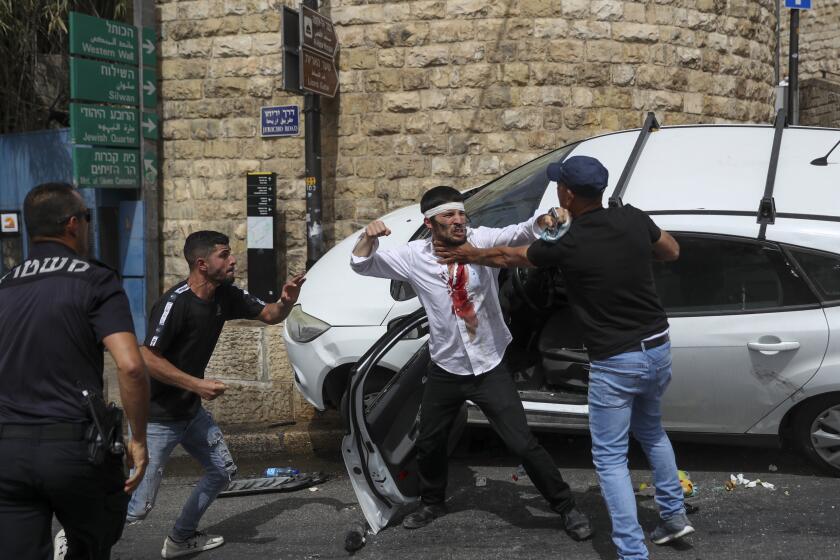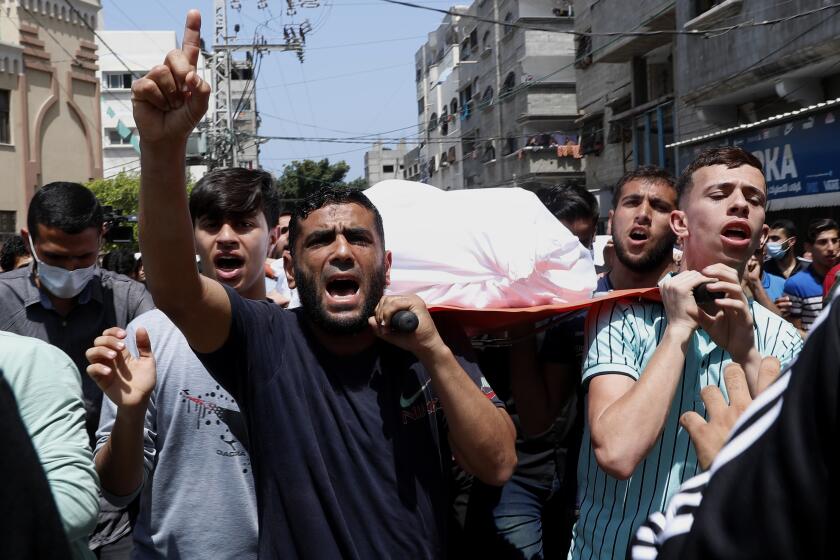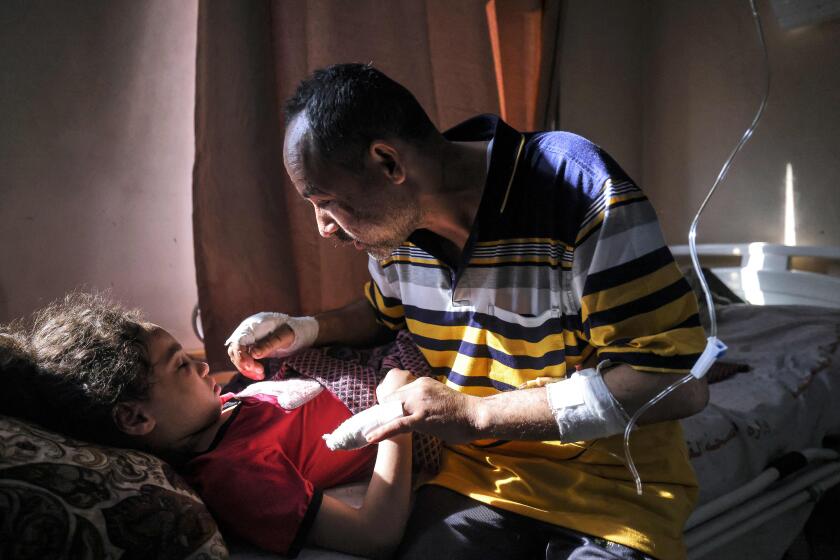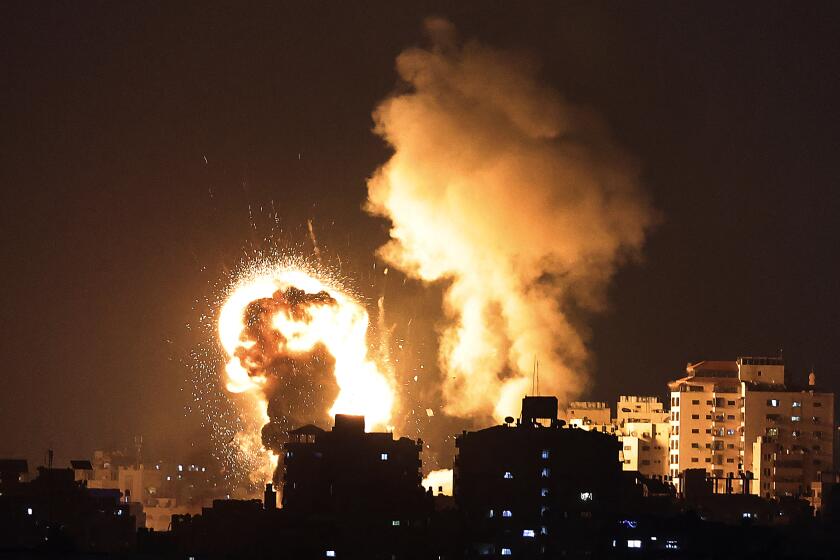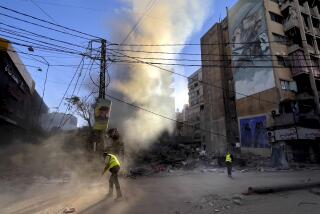Casualties mount as continued Israeli strikes, Palestinian militants’ rocket fire raise specter of all-out war
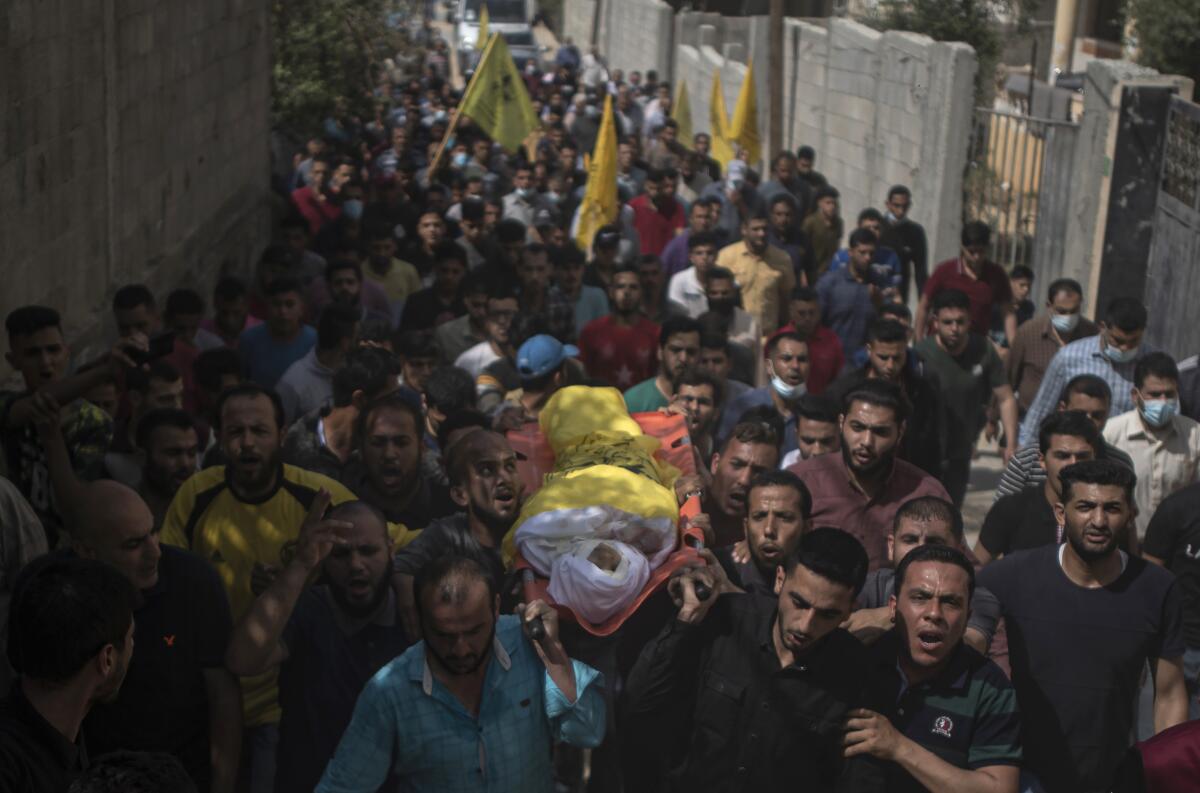
TEL AVIV — The escalating violence between Israeli forces and Palestinian militants pressed into Wednesday with an Israeli airstrike killing a senior Hamas commander in Gaza and rocket fire from the enclave causing the death of a person in Israel.
The bloodshed added to a spiraling casualty toll — more than 40 people dead in Gaza, including a number of children, and at least six in Israel — and further pushed the two sides toward outright war as the United Nations, the U.S. and other nations called for calm.
Hamas confirmed that its Gaza City commander, Bassem Issa, died in an airstrike Wednesday — the group’s highest-ranking military figure to be killed by Israel since 2014. The armed wing of Hamas said Issa was killed “along with a few of his fellow brothers of leaders and holy fighters” in Gaza. The Hamas-run Interior Ministry also said that the enclave’s central police headquarters in Gaza City, a compound with several buildings, was destroyed.
Israel’s internal security agency said several other senior Hamas militants besides Issa were killed in its intense air campaign over the densely packed territory, including the organization’s head of rocket development and cyber warfare, its head of rocket production and its engineering chief.
For their part, militants based in Gaza continued to launch rockets into Israel — more than 1,000 since the violence erupted, according to the Israeli military. An anti-tank missile fired across the border killed one Israeli and wounded two others. It was not immediately clear if they were soldiers or civilians.
Why is Biden treading so gingerly as violence escalates in Jerusalem, Israel and Palestinian territories? Four years of Trump’s pro-Israel policy, plus thorny domestic politics, leave Washington with fewer options than at any time in recent history.
On Tuesday, hundreds of rockets and interceptor strikes lighted up the night sky over Israel and Gaza. Flames leaped from blast sites, including a major Israeli oil pipeline and a bus that was hit in a city south of Tel Aviv.
All across Gaza, acrid smoke plumes from aerial bombardment rose skyward as at least one high-rise building was toppled and the dead, including children, were carried through the streets.
Adding to the sense of barreling momentum toward war, Israel’s main international airport shut down, and Prime Minister Benjamin Netanyahu warned that the strikes against Palestinian militants would grow in both force and numbers.
“We are embarking on an intense campaign,” Netanyahu said in an evening television appearance, flanked by Israel’s defense minister and military chief of staff. The militant groups Hamas and Islamic Jihad, the prime minister said, “will pay a very heavy price for their belligerence.”
Israel has unleashed new airstrikes on Gaza, hitting buildings believed to be harboring Hamas militants as the latest flare-up of violence escalates.
Hamas political leader Ismail Haniyeh, in a defiant speech, laid the blame on Israel for wielding a heavy hand in quelling weeks of unrest in Jerusalem, where protests erupted over the planned eviction of Palestinian families in the city’s traditionally Arab eastern sector.
“It’s the Israeli occupation that set Jerusalem on fire,” Haniyeh said. “And the flames have reached Gaza.”
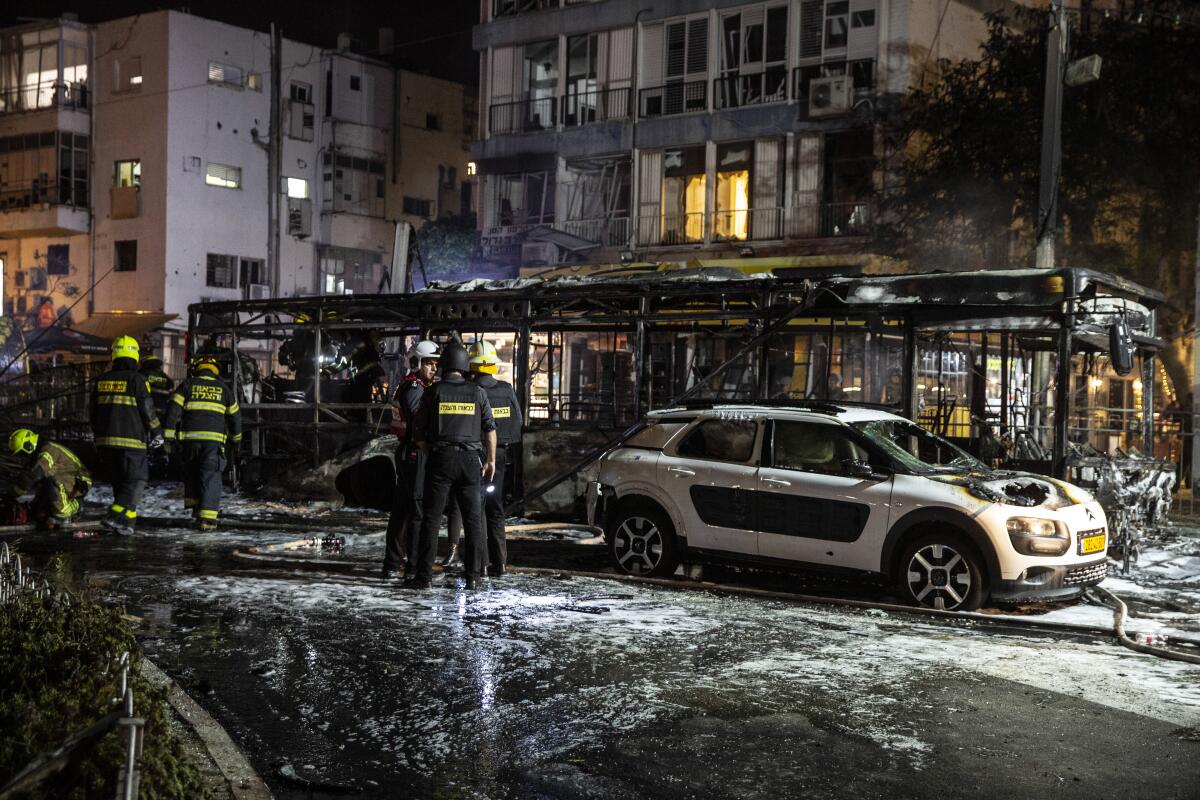
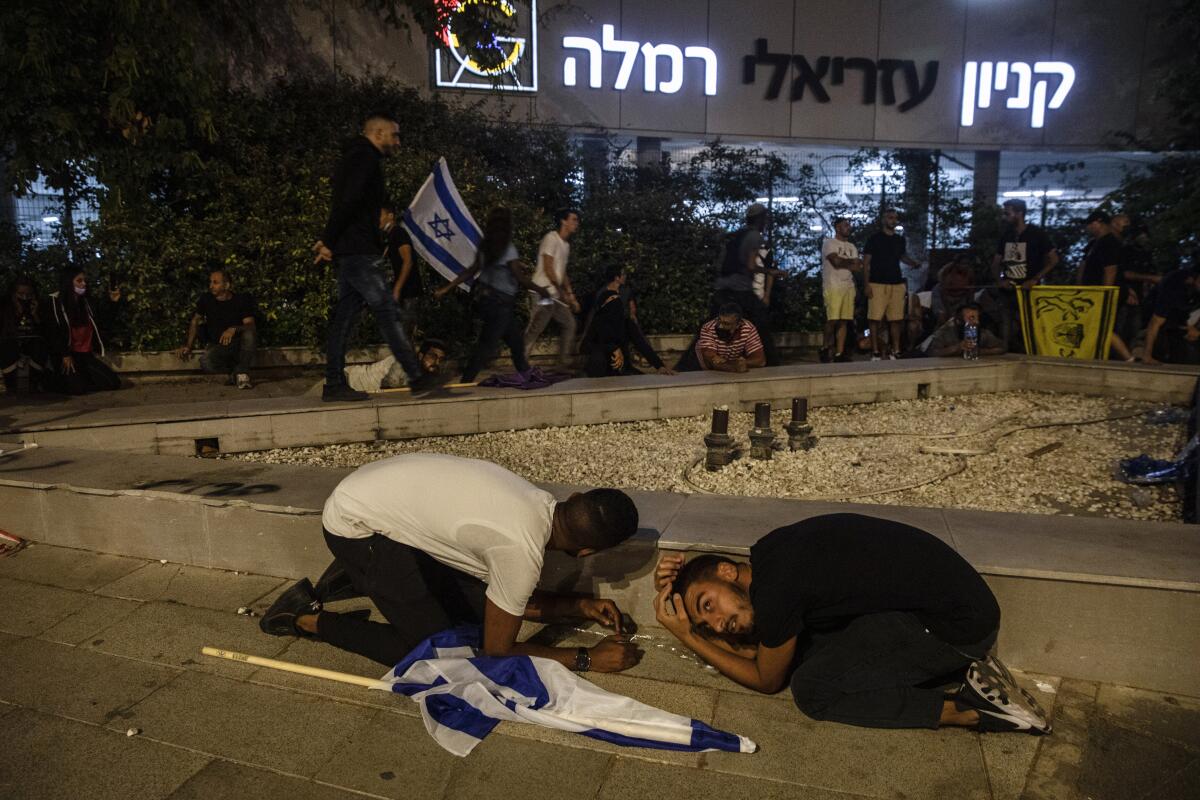
Israel and Hamas last fought a full-scale war in 2014 — their third such conflict since Hamas took control of Gaza in 2007 — and to many on both sides, the fast-moving events had the feel of another slide into encompassing combat.
“The equation between Israel and Gaza is now stark and simple,” Israeli journalist Anshel Pfeffer wrote on Twitter. Israel, he bleakly predicted, would bomb more Gaza high-rises, and Palestinian militants would aim rockets at Tel Aviv, with “no one around to break the cycle.”
Moreover, this outbreak of fighting — coupled with violent tactics employed by Israeli police against Palestinians in East Jerusalem, and the use of stun grenades and rubber bullets on Monday at the Aqsa Mosque compound, home to one of Islam’s holiest shrines — threatened to create a grave rupture between Israeli Jews and Palestinian citizens of the country, who make up about a fifth of its population of 9 million.
Israel continues its assault on the Gaza Strip as the U.S. and others call for a cease-fire.
Rioting broke out in several mixed Arab-Jewish Israeli cities, including Ramla and Lod, in the center of the country. In Lod, television images showed dozens of Jewish-owned cars in a parking lot set ablaze, and fires were set in several synagogues and shops. Israel’s Channel 12 reported that police escorted some Jewish residents from their homes for safety.
In Tel Aviv, people hunkered down for the night in stairwells and the bomb shelters of their apartment buildings, hours after rocket strikes on Mediterranean coastal communities to the south and on central Israel killed at least five people.
Officials said the injured included a little girl hurt in the town of Holon when a bus was hit by a rocket and caught fire. In Ashkelon, a city nearly 10 miles north of Gaza, an 89-year-old Holocaust survivor was seriously wounded in a strike that killed her home health aide, an Indian national, news reports said.
Gaza, an impoverished and densely packed seaside territory of 2 million people, to which nearly all access is controlled by Israel, was pocked by Israeli airstrikes, some only blocks or yards apart. The roar and clatter of hundreds of outgoing rockets fired by militants mingled with amplified chants from mosque loudspeakers, promising victory and vengeance.
Targets in Gaza included a 13-story building where Hamas had a civilian office, which collapsed after multiple strikes. Israeli drones first fired warning shots at the structure’s roof — a “knock” to warn those within to quickly exit — and no casualties were reported in that bombardment, although it sent terrified civilians fleeing, dodging falling debris.
“Everyone is running away in the street — you feel as if you are running from certain death,” said 29-year-old Ayman Mohamed, who lives near the toppled tower.
Islamic Jihad confirmed the deaths of three commanders in a separate strike, and Gaza’s Health Ministry said a woman and her disabled teenage son were killed in another. Palestinian officials reported at least 43 deaths — 13 of them children — since the bombardment began Monday night, and more than 300 injuries.
Hamas militants fired dozens of rockets into Israel on Monday, after hundreds of Palestinians were hurt in clashes with Israeli police at a religious site.
Israel has overwhelming military superiority to the militants, but the day’s events made clear Hamas’ ability to inflict damage. Israel’s Iron Dome missile defense system intercepted hundreds of rockets, but some got through. An oil pipeline between Ashkelon, on the Mediterranean, and the Red Sea city of Eilat caught fire after a direct rocket hit on a storage tank, in what Hamas was likely to view as a major tactical victory.
Neither side appeared ready to back down. The Israeli army chief of staff, Aviv Kochavi, said Israel had attacked 500 targets, adding: “We’re prepared to expand operations as much as necessary.”
And Abu Ubaida, spokesman for Hamas’ military wing, said destruction in Gaza would be met in kind.
“If the enemy persists and bombs civilian towers, then Tel Aviv will be on a date with a more severe missile strike,” he wrote on the Telegram messaging app.
Special correspondent Kraft reported from Tel Aviv and Times staff writer King from Washington. Special correspondent Hana Salah in Gaza City contributed to this report.
More to Read
Sign up for Essential California
The most important California stories and recommendations in your inbox every morning.
You may occasionally receive promotional content from the Los Angeles Times.
